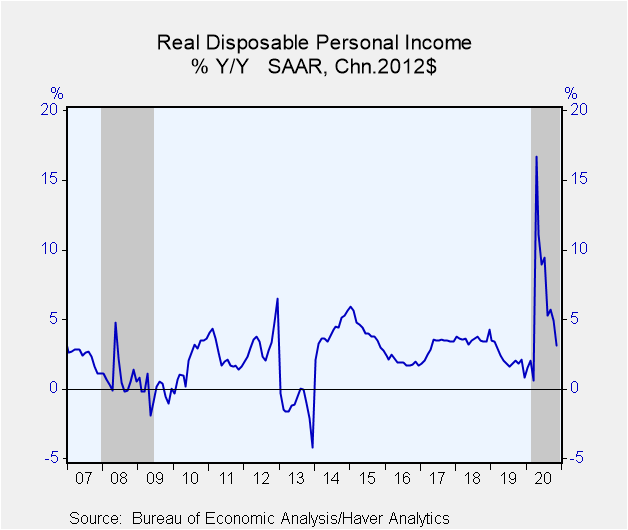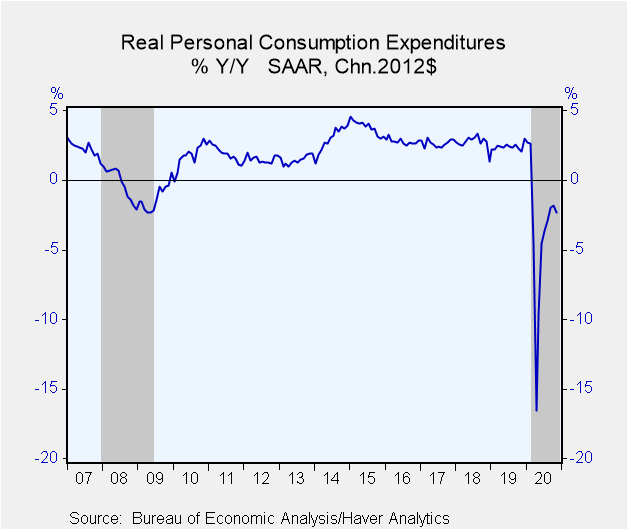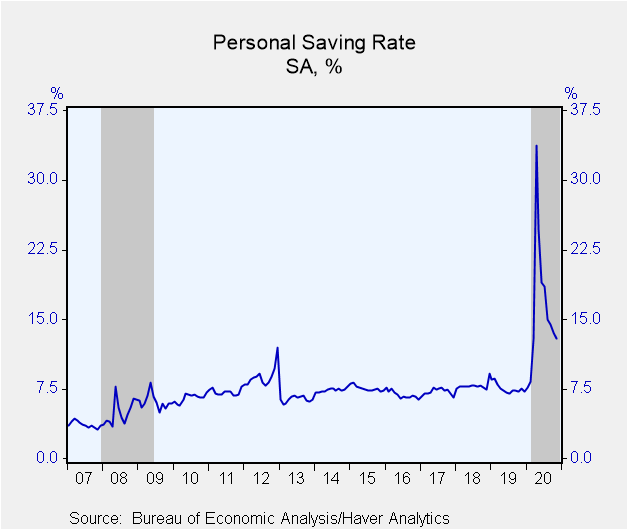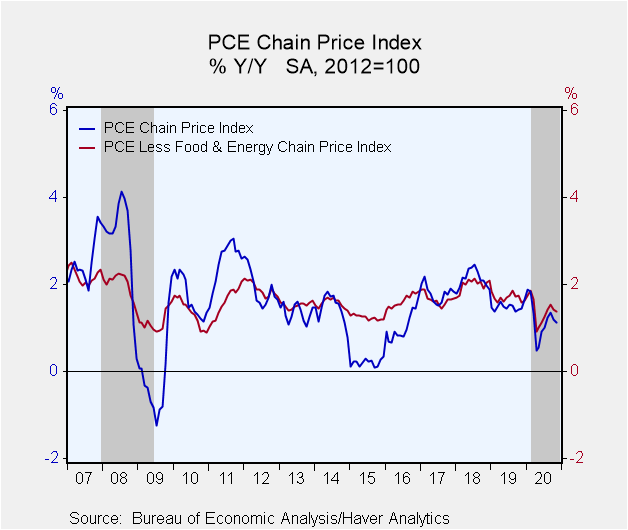 Global| Dec 23 2020
Global| Dec 23 2020U.S. Personal Income & Spending Decline in November
by:Tom Moeller
|in:Economy in Brief
Summary
• Income decline reflects fewer government payments. • Spending shortfall is widespread. • Prices again hold steady. Personal income declined 1.1% (+3.8% y/y) during November following a 0.6% October drop, revised from -0.7%. A 0.3% [...]
• Income decline reflects fewer government payments.
• Spending shortfall is widespread.
• Prices again hold steady.
Personal income declined 1.1% (+3.8% y/y) during November following a 0.6% October drop, revised from -0.7%. A 0.3% decline had been expected in the Action Economics Forecast Survey. A lessened 0.4% increase (2.0% y/y) in wages & salaries was accompanied by a fifth consecutive sharp decline in unemployment insurance benefits. Proprietors' income declined 8.5% (+2.8% y/y) as coronavirus food assistance payments to farmers dropped 71.6%. Paycheck protection loans to nonfarm businesses fell 71.3%. Offsetting these declines, rental income rose 0.5% (2.9% y/y). Income from assets improved 0.6% (-3.6% y/y) as dividend income gained 1.1% (-2.7% y/y). Transfer payments declined 3.3% (+18.0% y/y). Disposable personal income fell 1.2% (+4.3% y/y) last month after declining 0.7% in October. Adjusted for price inflation, real disposable income fell 1.3% (+3.1% y/y) after rising 0.8%.
Personal consumption expenditures decreased 0.4% during November (-1.3% y/y) following a 0.3% October rise. A 0.2% decline had been expected. Adjusted for price inflation, spending also decreased 0.4% (-2.4% y/y) in November. The fall in spending reflected a 1.7% decline (-12.1% y/y) in outlays on durable goods, led by a 3.4% shortfall (+3.1% y/y) in motor vehicle purchases. Spending on furniture & appliances weakened 1.1% (+10.6% y/y) while recreation goods & vehicles fell 1.0% (+24.8% y/y). Nondurable goods purchases fell 0.7% (+4.9% y/y). Clothing spending dropped 4.8% (-0.1% y/y). Gasoline spending fell 2.2% (-10.8% y/y) while outlays on food & beverages improved 0.9% (+7.4% y/y). Real outlays on services eased 0.2% (-6.7% y/y) as restaurant & hotel spending weakened 4.1% (-21.1% y/y). Transportation services outlays fell 2.3% (-25.7% y/y) as individuals stayed home. Housing & utilities spending declined 0.8% (+0.3% y/y). Offsetting these declines, recreation services spending strengthened 1.4% (-30.5% y/y). Health care outlays rose 0.8% (-4.2% y/y).
Last month's lesser decline in spending relative to the large drop in income lowered the personal saving rate to 12.9% from 13.6% in October. The rate reached a record high 33.7% in April. The level of personal saving fell 6.4% (+79.6% y/y).
The PCE chain price index held steady (1.1% y/y) in November for the second straight month. The price index excluding food and energy also was stable for a second month. Energy prices increased 0.4% (-9.9% y/y) after inching 0.1% higher in October. Food & beverage prices eased 0.1% (+3.7% y/y), the fourth decline in five months.
The personal income and consumption figures are available in Haver's USECON database with detail in the USNA database. The Action Economics figures are in the AS1REPNA database.
Tom Moeller
AuthorMore in Author Profile »Prior to joining Haver Analytics in 2000, Mr. Moeller worked as the Economist at Chancellor Capital Management from 1985 to 1999. There, he developed comprehensive economic forecasts and interpreted economic data for equity and fixed income portfolio managers. Also at Chancellor, Mr. Moeller worked as an equity analyst and was responsible for researching and rating companies in the economically sensitive automobile and housing industries for investment in Chancellor’s equity portfolio. Prior to joining Chancellor, Mr. Moeller was an Economist at Citibank from 1979 to 1984. He also analyzed pricing behavior in the metals industry for the Council on Wage and Price Stability in Washington, D.C. In 1999, Mr. Moeller received the award for most accurate forecast from the Forecasters' Club of New York. From 1990 to 1992 he was President of the New York Association for Business Economists. Mr. Moeller earned an M.B.A. in Finance from Fordham University, where he graduated in 1987. He holds a Bachelor of Arts in Economics from George Washington University.
More Economy in Brief
 Global| Feb 05 2026
Global| Feb 05 2026Charts of the Week: Balanced Policy, Resilient Data and AI Narratives
by:Andrew Cates










